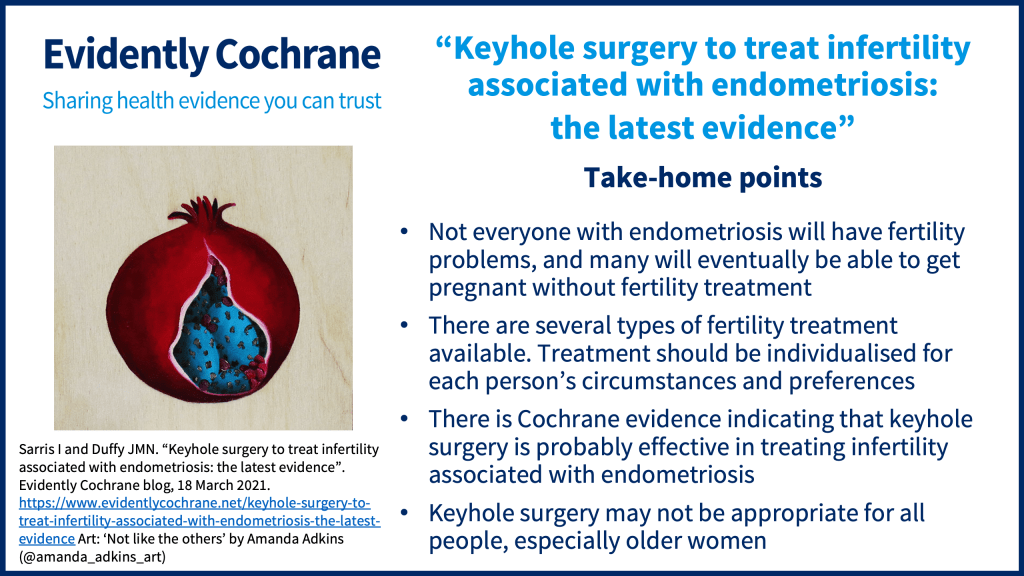In this blog for people with endometriosis, Dr Ippokratis Sarris, Consultant in Reproductive Medicine and the Director of King’s Fertility, and Dr James Duffy, Clinical Fellow at King’s Fertility, discuss the reasons why endometriosis causes fertility problems, potential treatmentSomething done with the aim of improving health or relieving suffering. For example, medicines, surgery, psychological and physical therapies, diet and exercise changes. options, and the latest Cochrane evidenceCochrane Reviews are systematic reviews. In systematic reviews we search for and summarize studies that answer a specific research question (e.g. is paracetamol effective and safe for treating back pain?). The studies are identified, assessed, and summarized by using a systematic and predefined approach. They inform recommendations for healthcare and research. on keyhole surgery (laparoscopic surgery) for endometriosis.
This blog is the fourth in our #MyEndometriosisQuestion series running throughout March, with blogs about endometriosis and an invitation to ask your questions, which will be addressed by a panel of experts. More details at the end of this blog.
Featured image: ‘No-one can see it’ by Margaret Kalms* http://www.endowomanart.com
Page last checked 30 June 2023

What is endometriosis?
In the video below, Dr Kuhan Rajah explains what endometriosis is. Dr Rajah is a consultant obstetrician and a sub-specialist in reproductive medicine at King’s Fertility. His areas of expertise are gynaecological and early pregnancy ultrasound, minimally invasive surgery, and all aspects of fertility medicine.
.
Why does endometriosis cause fertility problems?
.
.
It is not fully understood why it may be more difficult for some people with endometriosis to become pregnant. Depending on the severity of the endometriosis, between 30% to 50% of people with endometriosis may experience fertility problems. Endometriosis can influence fertility in several ways:
- distorted anatomy of the pelvis
- adhesions (bands of scar-like tissue)
- damage to the fallopian tubes or ovaries
- inflammation of the pelvic structures
- altered immune system functioning
- changes in the hormonal environment of the eggs
- impaired implantation of a pregnancy
- altered egg quality
The exact nature of the link between fertility problems and endometriosis is unclear but the severity of the condition and location of the tissue appears to have an effect. It is not fully known why and how mild endometriosis affects the chances of getting pregnant. But people with severe endometriosis, which causes considerable scarring, blocked fallopian tubes, and damaged ovaries, experience the most difficulty becoming pregnant and often require Assisted Reproductive Techniques (ART) treatment, including in-vitro fertilisation (IVF). However, even with severe endometriosis natural conception is still possible.
It is also important to remember that not everyone with endometriosis will have problems, and many will eventually be able to get pregnant without treatment.
How long should I wait before being referred to a fertility clinic?
Although endometriosis can have an effect on one’s chances of getting pregnant, most people who have mild endometriosis do not have fertility problems. An estimated 50-75% of women with mild to moderate endometriosis will get pregnant without treatment.
The general advice given to people is to see your GP if you have not conceived after a year of trying. However, if you know that you have endometriosis and are failing to conceive, you should talk to your doctor sooner who can refer you to a fertility specialist.
As female fertility decreases with age, you should also seek advice sooner rather than later if you are aged beyond the mid-30s, as the decline in fertility speeds up. If you are in a relationship, it is always best for both partners to be assessed, as fertility problems can affect either or both. Your doctor will be able to do an initial assessment to check for things that may be causing your fertility problems and advise you about what to do next.
Assuming that other factors, such as semen quality, fallopian tubes, and ovulation, are normal (and that the woman’s age is not advanced) NICE recommends that IVF is offered to women with endometriosis after two years of trying for a baby unsuccessfully.
Evaluating fertility: a role for surgery?
Before starting any fertility treatment, a complete fertility evaluation should be performed. Both partners should be assessed, as fertility problems can affect either or both. This can include hormone and other blood testing, as well as checking the partner’s sperm count. All women with fertility problems should be offered an ultrasound scan. This is done not only in order to assess for the possible presence of endometriosis, but also to look at the pelvis in general, the ovarian reserve and any other possible pathologies (such as fibroids, endometrial polyps, womb shape, and dilated fallopian tubes).
Although moderate and severe endometriosis is usually detectable on ultrasound, more mild forms of endometriosis is more difficult (or sometimes impossible) to detect just on ultrasound.
Currently, only keyhole surgery can give the most detailed information regarding the presence and extent of endometriosis. As this involves a surgical procedure, it entails certain risks. Therefore, it should not be undertaken lightly or as a routine for all women diagnosed with fertility problems.
You can read more about diagnosing endometriosis in these Evidently Cochrane blogs – blood tests for diagnosing endometriosis: the latest evidence and ultrasound for diagnosing endometriosis: the latest evidence.
What are my treatment options?
.
There is no such thing as ‘the best fertility treatment’. There are several types of fertility treatment available. What type of fertility treatment you might want to pursue depends on the severity of endometriosis, your age, other medical conditions, past pregnancies, and whether there are other identified fertility problems such as blocked tubes or sperm problems. Your preferences, for example, continuing trying to conceive without fertility treatment or favouring a less invasive fertility treatment, and circumstances, for example, your individual work circumstances or family and carer obligations, should be considered when developing a treatment plan.
Medical treatments
Currently, there is no evidence that taking medicines can improve a person’s chances of getting pregnant.
Assisted reproductive techniques (ART)
ART treatments, such as Intrauterine Insemination (IUI) or In Vitro Fertilisation (IVF) are established treatments for endometriosis-related infertility. We will discuss these in more detail in a blog we will publish later this week.
Keyhole surgery
One treatment option is keyhole surgery which aims to remove deposits of endometriosis and scar tissue from the surface of the womb, fallopian tubes, and ovaries. This is a popular treatment choice for women with infertility associated with endometriosis.
James was part of the research team which prepared a systematic reviewIn systematic reviews we search for and summarize studies that answer a specific research question (e.g. is paracetamol effective and safe for treating back pain?). The studies are identified, assessed, and summarized by using a systematic and predefined approach. They inform recommendations for healthcare and research., Laparoscopic surgery for endometriosis, published in October 2020, on behalf of the Cochrane Gynaecology and Fertility Group. We brought together the evidence from all published research studies evaluating keyhole surgery for the treatment of infertility associated with endometriosis. We included research studies that randomly allocated women with infertility associated with endometriosis to undergo keyhole surgery, including treatment of endometriosis, or diagnostic keyhole surgery only. We identified three research studies which included 528 women.
After systematically reviewing the evidence, we concluded there was moderate quality evidence that laparoscopic surgery probably increases pregnancy rates compared to diagnostic laparoscopy in women with mild to moderate endometriosis. Unfortunately, there was insufficient evidence concerning adverse events to allow us to draw any conclusions regarding safetyRefers to serious adverse effects, such as those that threaten life, require or prolong hospitalization, result in permanent disability, or cause birth defects..
There was no high-certaintyThe certainty (or quality) of evidence is the extent to which we can be confident that what the research tells us about a particular treatment effect is likely to be accurate. Concerns about factors such as bias can reduce the certainty of the evidence. Evidence may be of high certainty; moderate certainty; low certainty or very-low certainty. Cochrane has adopted the GRADE approach (Grading of Recommendations Assessment, Development and Evaluation) for assessing certainty (or quality) of evidence. Find out more here: https://training.cochrane.org/grade-approach evidence when considering people with severe endometriosis. In our clinical experience, if severe endometriosis is present, surgery is often performed to remove scar tissue or large endometriotic cysts in an attempt to restore the normal pelvic anatomy. It is thought this may allow the reproductive organs to function more normally and lead to an increased chance of a pregnancy.
Unfortunately, for some women, endometriosis can come back after surgery. If endometriotic cysts in the ovaries come back, and these are removed repeatedly, this can cause a loss of eggs from the ovaries which can make it harder to become pregnant.
Questions to ask your fertility specialist
- Would keyhole surgery be an effective treatment for me?
- What are the risks of keyhole surgery?
- What are the alternatives to keyhole surgery?
- How will keyhole surgery affect my egg count (ovarian reserve) and future fertility potential?

More about #MyEndometriosisQuestion – and ask yours
You can find out more in the blog Endometriosis: #MyEndometriosisQuestion – a special series, including how to ask your question on our social media platforms, or you can post your question below this blog. While our experts cannot give specific medical advice, they can provide information about endometriosis, relevant evidence and guidelines, and tips for discussing endometriosis with your own health professional. Our expert panel will do their best to answer your questions individually. They will also reflect on some of the submitted questions in a blog to be published at the end of the month. No individuals will be named or identified in this blog.
Support for women with endometriosis
There is a vibrant online community of women with endometriosis, commonly known as #endosisters, who share knowledge and offer support, along with charities such as Endometriosis UK and grassroots organisations such as Fair Treatment for the Women of Wales.
Further information about endometriosis
- Cochrane Gynaecology and Fertility: Endometriosis Awareness Month
- Endometriosis UK
- King’s Fertility: What is endometriosis?
- The British Society for Gynaecological Endoscopy (BGSE) maintains a list of accredited endometriosis centres.
- Fertility Network UK
- Fertility Europe
- Resolve
Join in the conversation on Twitter with @KingsFertility @JamesMNDuffy @CochraneUK and @CochraneCGF or leave a comment on the blog. Comments are checked by the Editors before they are made public on the blog.
Please note, we cannot give specific medical advice and do not publish comments that link to individual pages requesting donations or to commercial sites, or appear to endorse commercial products. We welcome diverse views and encourage discussion but we ask that comments are respectful and reserve the right to not publish any we consider offensive. Cochrane UK does not fact check – or endorse – readers’ comments, including any treatments mentioned.
Ippokratis Sarris and James Duffy have nothing to disclose.
References and further reading (pdf)
*Images used with permission and cannot be reused without permission from the artists.




[…] the complete article from Cochrane, along with videos discussing endometriosis and fertility, visit their website. You can also learn more about endometriosis on the Giving Birth with […]
[…] the complete article from Cochrane, along with videos discussing endometriosis and fertility, visit their website. You can also learn more about endometriosis on the Giving Birth with […]